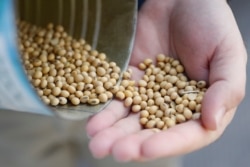Chinese companies have stopped buying U.S. agricultural products, China's Commerce Ministry said on Tuesday, a blow to U.S. farmers who have already seen their exports slashed by the more than year-old trade war.
China may impose additional tariffs on U.S. farm products bought shortly before the purchase ban took effect, China's Commerce Ministry said. China also let the yuan weaken past the key 7-per-dollar level on Monday for the first time in more than a decade.
Before the trade war started, China bought $19.5 billion worth of farm goods in 2017, mainly soybeans, dairy, sorghum and pork. The trade war reduced those sales to $9.1 billion in 2018, according to the American Farm Bureau.
China's Ministry of Commerce said in a statement it hoped the United States would keep its promises and create the "necessary conditions" for bilateral cooperation.
U.S. President Donald Trump said on Thursday that Beijing had not fulfilled a promise to buy large volumes of U.S. farm products and vowed to impose new tariffs on around $300 billion of Chinese goods, abruptly ending a truce in the Sino-U.S. trade war.
Earlier, China's state broadcaster CCTV reported an official from China's National Development and Reform Commission (NDRC) as saying Trump's accusations were "groundless."
China is the world's top buyer of soybeans, the most valuable U.S. export crop. The Trump administration has announced plans to spend up to $28 billion compensating U.S. farmers, a key Trump constituency, for lost income from trade disputes.
American Farm Bureau Federation President Zippy Duvall called the announcement "a body blow to thousands of farmers and ranchers who are already struggling to get by."
The National Pork Producers Council said in an email it was important to end the trade war so pork producers could "more fully participate in a historic sales opportunity."
Farmers can start applying for the next round of trade aid this month, but trade uncertainty makes long-term planning difficult.
"We've been thankful for the aid payments. They have helped but we'd rather have open markets because it creates stability in our financial sectors," said Derek Sawyer, 39, a corn, soybean, wheat and cattle farm from McPherson, Kansas. "There's just so much volatility right now because nobody knows the rules of the game and nobody knows how to look at things going forward."
China is buying more soybeans from Brazil. Its overall need for soybeans used to feed livestock has fallen as African Swine Fever kills millions of pigs. U.S. meat exporters had hoped to take advantage of the disease to export more pork to China but 62% retaliatory tariffs have limited exports.
Overall, China has purchased about 14.3 million tons of last season's soybean crop, the least in 11 years, and some 3.7 million tons still need to be shipped, according to U.S. data.
China bought 32.9 million tons of U.S. soybeans in 2017, before the trade war.
China applied a 25% tariff on soybeans in July of last year in response to U.S. tariffs on Chinese goods.
China is honoring agreements signed earlier to import U.S. soybeans, according to Cong Liang, secretary general of China's NDRC, CCTV reported. The report said that 2.27 million tons of U.S. soybeans had been loaded and shipped to China in July, since Trump met Chinese President Xi Jinping in Osaka at the G20 summit at the end of June.
China bought 130,000 tons of soybeans, 120,000 tons of sorghum, 60,000 tons of wheat, 40,000 tons of pork and products, and 25,000 tons of cotton from the United States between July 19 and Aug. 2, Cong said according to the report.
Weekly U.S. data on Aug. 1 confirmed the first new U.S. soybean sale to China since June, of 68,000 tons from the crop that will be harvested this fall. Additional sales through Aug. 1 could be recorded in the next U.S. government export sales report on Thursday.
Two million tons of U.S. soybeans destined for China will be loaded in August, followed by another 300,000 tons in September, Cong said.
However, the U.S. Department of Agriculture said on Monday less than 600,000 tons of soybeans were inspected for export to China the week ended Aug. 1, fewer than the previous week.







